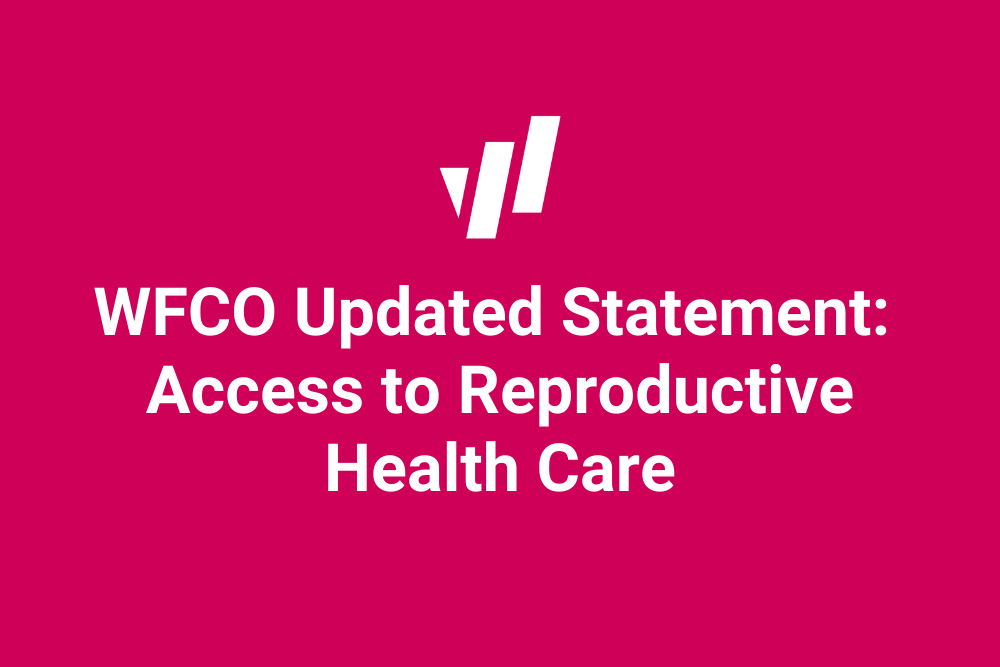
WFCO Statement on Access to Reproductive Health Care
Our Board and Staff Recently Reassessed Our 2019 Statement. We Decided It Was Time to Change.
Our history of advocating for access to reproductive health care
In the 35 years of our existence, our mission and vision have been reframed but our goal remains the same: to address the feminization of poverty. This includes ensuring that women have the rights and resources necessary to plan whether or when to have a child. The Women’s Foundation of Colorado has taken action in several ways to uphold this commitment:
- We opposed personhood ballot measures in 2008, 2010, 2012, and 2014.
- In 2015, we supported the LARC4CO coalition with both financial and advocacy assistance.
- In 2020, WFCO opposed a ballot measure that would have prohibited abortions after 22 weeks.
While we are proud of our past support, we must acknowledge that many women, especially women of color, have been at the forefront of the reproductive justice movement in this state. We are fortunate to have their leadership.
Current context
Roe v. Wade has protected women’s access to abortion nationally since The Women’s Foundation of Colorado’s inception. However, in a time when federal protections for access to abortion are being eroded and other states enact laws to control women’s bodies, lives, and futures, The Women’s Foundation of Colorado knows we must use our voice and influence with unprecedented judiciousness. Our board and staff recently reassessed our 2019 statement on women’s access to reproductive health care. Two lines caught our attention:
“WFCO supports access to the full range of reproductive health information, care, and justice for women statewide” and “We believe that women have the right to decide to have or not to have children, free from stigma.” Despite our advocacy for previous measures, we questioned whether we were perpetuating the stigmatization of abortion by not naming it and using euphemisms. Were we truly communicating that any individual reproductive health care decision should be made and met without stigma?
We humbly acknowledged that it was time to evolve. To meet the needs of Colorado women of every background and identity, we understand we must name issues. Therefore, we affirm that access to abortion is critical to the achievement of gender, racial, and economic equity. Our board updated our existing reproductive health care statement to reflect this change.
Updated Reproductive Health Statement
The Women’s Foundation of Colorado is committed to economic security for all women and girls regardless of background or identity. Research clearly links full access to reproductive health resources to economic security.
To promote justice for women, WFCO supports access to the full range of reproductive health information and services, including abortion care. We believe in the right to decide to have or not have children, free from stigma.
Statewide implications
Restrictions and obstacles on accessing comprehensive reproductive health care, including abortion care, fall hardest on low-income people statewide trying hard to make ends meet and other marginalized groups. Colorado has a strong history of supporting and protecting access to reproductive health care. Colorado was the first state to decriminalize abortion care in an overwhelmingly bipartisan effort in 1967, well before the Supreme Court affirmed the right to abortion care nationwide in Roe v. Wade.
We are fortunate that Colorado voters have overwhelmingly opposed statewide ballot measures limiting access to abortion. However, Roe v. Wade, which has given federal protection to abortion since 1973, is at great risk of being dismantled in 2022, making proactive protection of access to abortion care statewide essential.
In anticipation of the loss of federal protection to abortion, we supported the Reproductive Health Equity Act and opposed three bills that would limit access to abortion in the 2022 Colorado legislative session.
HB22-1279, the Reproductive Health Equity Act, was signed into law on April 4, 2022, and modernizes Colorado statute to protect abortion rights from federal threat.
Thank you to the following for helping to pass the Reproductive Health Equity Act
WFCO Honorary Trustee Brook Kramer testified for the Reproductive Health Equity Act. We are grateful to her for speaking on behalf The Foundation and Colorado women. We also thank the Colorado Organization for Latina Opportunity and Reproductive Rights (COLOR) and COBALT, who led the Reproductive Health Equity Act coalition and whose missions and resources are dedicated to guaranteeing abortion access to women in Colorado.
Lastly, we thank Majority Leader Rep. Daneya Esgar, Rep. Meg Froelich, and Sen. Julie Gonzales for their sponsorship of the bill and members of the Colorado House Health and Insurance Committee for passing the measure.
In developing our updated statement, our board of trustees epitomized what respecting diverse voices and perspectives can look like. The Women’s Foundation is a place of many backgrounds and identities, and when we address key issues, a spectrum of viewpoints inevitably emerges. In today’s polarized world, we are proud that our board recognizes that our work is about people, not politics. Committed to civil conversation, our board of trustees worked to move our vision, mission, and values forward, even in the face of varied personal beliefs.

